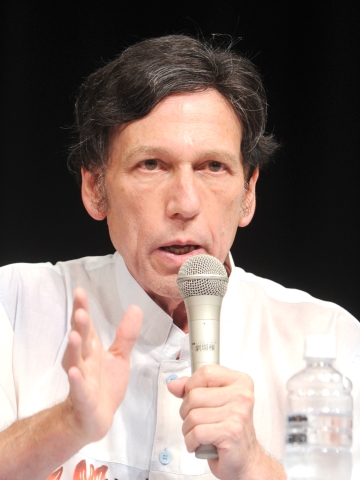Messages from intellectuals overseas to Okinawan people

Peter Kuznick
On February 7, 29 internationally prominent intellectuals released a statement that opposes moving U.S. Marine Corps Air Station Futenma to the Henoko district in Nago and seeks the prompt closure and return of the base. The Ryukyu Shimpo introduces their messages to the readers.
Stand tall, fight bravely and know you are not alone
Peter Kuznick
Professor of History, American University,co-author the book and ten part TV series “The Untold History of the United States”.
When Oliver Stone, Satoko Norimatsu, and I visited Okinawa this summer, we met many extraordinary people from all walks of life, who greeted us with kindness and generosity. Among them were several extremely dedicated elected officials. Two who stand out especially vividly in my memory are former Governor Masahide Ota and Nago Mayor Susumu Inamine. All too often, elected officials are people without backbone or principle who will sell out their constituents for power or money for public works as Governor Nakaima just did. But Oliver and I knew right away that Ota-san and Inamine-san were different. They sincerely and passionately cared about the people of Okinawa and they understood that the fight to block the relocation of the Futenma U.S. Marine base to Henoko was being waged not only for the Okinawans but for people committed to social justice everywhere.
I have followed Okinawa developments closely since returning to Washington, DC. Nothing has given me more pleasure than to see Mayor Inamine’s reelection this past weekend. To the global anti-base forces, Mayor Inamine has become the face of all the brave people who have been resisting the encroachment of U.S. military bases everywhere across the planet. The U.S. “empire of bases,” as the late Chalmers Johnson called it—between 700 and 1,000 outside the U.S. and its territories—has enabled the militarization of conflict after conflict for almost 70 years. Many of us believe that a different way of settling disputes must be found. Bombing and invasions haven’t worked. An Okinawa polluted by U.S. bases won’t make either the people of Japan or the people of the United States any safer. In fact, it is likely to have the opposite effect.
My message to the people of Okinawa is to stand tall, fight bravely, and know you are not alone. Your friends outside Japan will continue to do everything we can to spread the word or your heroic struggle. And with leaders like Inamine-san and Ota-san, there remains hope that we will succeed.
It’s time, finally, for Washington to listen
John Feffer
Co-director of Foreign Policy In Focus (www.fpif.org) at the Institute for Policy Studies

John Feffer
The news that Susumu Inamine has won reelection as mayor of Nago City is tremendous. Not only does it give a tremendous boost to organizations on both sides of the Pacific that are fighting against the construction of another U.S. military base on Okinawa. It also reaffirms two important principles that underlie this struggle.
The first is that this campaign is one of democratic self-determination. Both the U.S. and Japanese governments have claimed that they will not impose a solution on the Okinawan people. Time and again, the Okinawan people have spoken, at the neighborhood, municipal, and prefectural level. They want the U.S. military presence on the island to shrink, not grow or simply be shifted around. The recent vote in Nago City is only the latest in a series of democratic decisions. If Washington and Tokyo want to continue to claim that they are acting within the structures of a democracy, they must recognize the results of this election.
The second point has to do with money. Often the supporters of military bases will speak of the economic benefits that come with the presence of U.S. soldiers. And it is true that some businesses do benefit from the influx of U.S. dollars.
But not everything is about money. The vast majority of Okinawans have repeatedly said – through opinion polls and in elections – that they value some things more than mere money. Indeed, in these last elections in Nago City, the LDP promised an injection of 50 billion yen into Nago City to induce the votes for pro-base candidate.
Not even this bribe could persuade the majority of voters. This issue is not about money.
The United States has promised to shrink its military footprint on Okinawa. It has promised to respect the democratic wishes of the Okinawans. The Okinawans have spoken once again. It’s time, finally, for Washington to listen.
We have been inspired by the people of Nago
Joseph Gerson
Director, Peace & Economic Security Program, American Friends Service Committee

Joseph Gerson
On behalf of the initiators of the statement opposing the construction of the Marine air base at Henoko and solidarity with the Okinawan people, I write to let you know that we have been inspired by and congratulate the people of Nago who successfully resisted militarism and political corruption with the exciting and hope filled reelection of Mayor Inamine.
With Prime Minister Abe, Governor Nakaima, and the U.S. disregarding the will of Nago voters and their vows to move forward with the base construction, persistence will be necessary, and we pledge continued solidarity with those committed to protecting the people and environment of Nago and Okinawa.
Nago voters refused to be bought with cynical offers of development assistance and envelopes stuffed with cash. They held to their life-affirming commitments. No local Japanese community has ever before so courageously resisted Tokyo’s will on an issue of such high priority to the government or the military alliance.
Nago voters have blocked the campaign to reinforce U.S. military colonization of Okinawa for decades to come. It was a victory that will resonate across Okinawa, Japan and communities across Asia and the Pacific, inspiring people to take action to bring a more peaceful and sustainable world into being.
Unfortunately, the struggle is not over. Despite their rhetoric about shared values, Prime Minister Abe and President Obama are contemptuous of democracy as practiced by the people of Nago. Abe was embarrassed that he was unable to deliver on his commitments to the Pentagon and is now moving disregard the election’s outcome. We encourage Okinawans to defend your victory, and we will act in solidarity. This is not the first time that Prime Minister Abe has overreached. In 2007, he worked to impose his nationalist agenda, and his government collapsed as a result.
We are encouraged that our statement encouraged people in a “dark” time, and we remain committed to working in support of the peaceful and democratic people of Nago and Okinawa to ensure that the Henoko base will never be built, that the Futenma base will be closed, and to replace military colonialism with Common and Human Security.
Learning about democracy from Oura Bay
Alexis Dudden
Professor of History, University of Connecticut

Alexis Dudden
My son is learning about democracy from Oura Bay. He is 8 years old, and he swam in its delicate waters first when he was 4, and then again when he was 7. He loves climbing on its rocks and catching crabs and making new friends on its beaches. It is not easy for us to come for a swim because we live on the East Coast of the United States, but it is important. It is important because in Oura Bay my son understands that he can play with others even when he doesn’t speak all of their words; he realizes that he and children of his generation everywhere must give voice to animals and ecosystems that cannot save themselves from people; and, most important now he grasps that as an American he has tremendous responsibility to know what happens around the world in his name.
During our last visit in July 2012, we saw the new wall with its towering barbed wire fence separating the Okinawan beach from the American beach. We couldn’t believe our eyes. We couldn’t believe that our taxes had gone to replacing the old wire roll with this awful more permanent structure, and we hear that an even higher and thicker one is planned. Maybe it’s already been built. This ugly structure is an embarrassment to the United States. It makes Oura Bay’s lessons clearer and makes us promise never to stop learning from, teaching about, and fighting for the peaceful present and future of these waters. 頑張りましょう!
Previous Article:[Editorial]Dear US ambassador to Japan Caroline Kennedy: We want the US government to change its Futenma replacement policy and cancel Henoko landfill
Next Article:A natural treasure trove Oura Bay: Building new U.S. base will destroy the environment, nature and life
[Similar Articles]
- Okinawa reversion’s key negotiator meets Nago Mayor in Okinawa
- Nago mayor prepared to go on his own visit to the United States in January
- US documentary filmmaker Regis Tremblay conveys harm caused by military bases
- Nago Mayor delivers lecture in Washington, D.C. criticizing Japanese government
- 2,200 people mark 45th anniversary of reversion by holding rally to call for an Okinawa without military bases
 Webcam(Kokusai Street)
Webcam(Kokusai Street)


